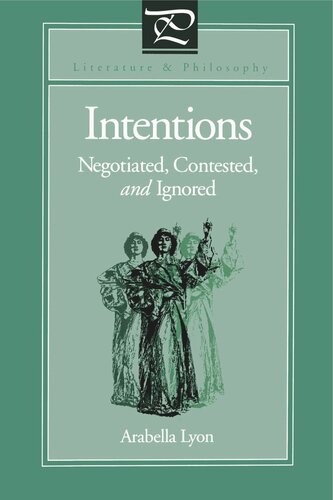

Most ebook files are in PDF format, so you can easily read them using various software such as Foxit Reader or directly on the Google Chrome browser.
Some ebook files are released by publishers in other formats such as .awz, .mobi, .epub, .fb2, etc. You may need to install specific software to read these formats on mobile/PC, such as Calibre.
Please read the tutorial at this link: https://ebookbell.com/faq
We offer FREE conversion to the popular formats you request; however, this may take some time. Therefore, right after payment, please email us, and we will try to provide the service as quickly as possible.
For some exceptional file formats or broken links (if any), please refrain from opening any disputes. Instead, email us first, and we will try to assist within a maximum of 6 hours.
EbookBell Team

4.1
60 reviewsThe relationship between an author's and an audience's intentions is complex but need not preclude mutual engagement. This philosophical investigation challenges existing literary and rhetorical perspectives on intention and offers a new framework for understanding the negotiation of meaning. It describes how an audience's intentions affect their interpretations, shows how audiences negotiate meaning when faced with a writer's undecipherable intentions, and defines the scope of understanding within rhetorical situations.
Introducing a concept of intention into literary analysis that supersedes existing rhetorical theory, Arabella Lyon shows how the rhetorics of I. A. Richards, Wayne Booth, and Stanley Fish, as well as the hermeneutics of Hans-Georg Gadamer, fail to account for the complex interactions of author and audience. Using Kenneth Burke's concepts of form, motive, and purpose, she builds a more complex notion of intention than those usually found in literary studies, then employs her theory to describe how philosophers read Wittgenstein's narratives, metaphors, and reversals in argument.
Lyon argues that our differences in intention prevent consistency in interpretations but do not stop our discussions, deliberations, and actions. She seeks to acknowledge difference and the communicative problems it creates while demonstrating that difference is normal and does not end our engagement with each other.
Intentions combines recent work in philosophy, literary criticism, hermeneutics, and rhetoric in a highly imaginative way to construct a theory of intention for a postmodern rhetoric. It recovers and renovates central concepts in rhetorical theory—not only intention but also deliberation, politics, and judgment.